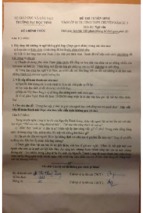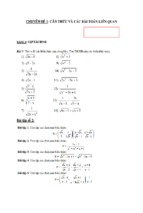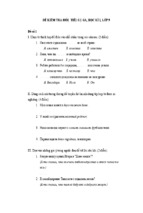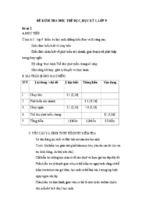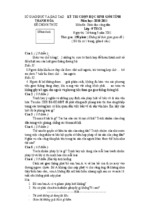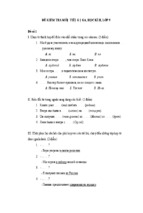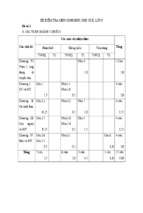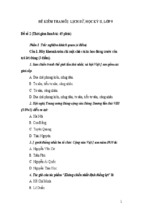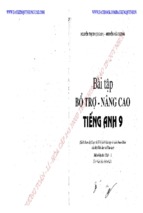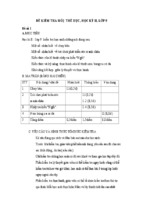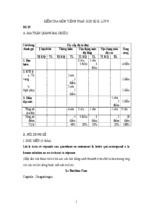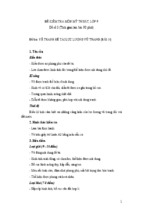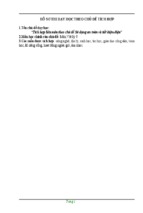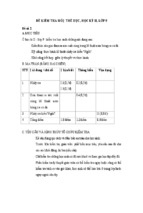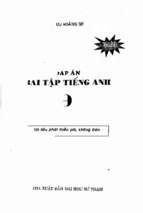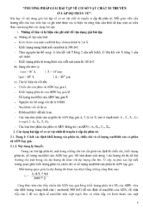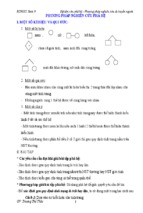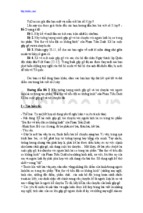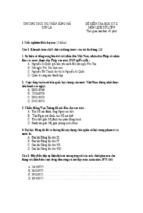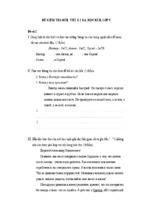¤n thi vµo líp 10 THPT m«n TiÕng Anh
PhÇn I: Grammar ( ng÷ ph¸p c¬ b¶n)
1. The tenses ( C¸c th× trong TiÕng Anh): Bao gåm
1.1 The present simple tense ( th× hiÖn t¹i ®¬n)
1.2 The present continuous ( th× hiÖn t¹i tiÕp diÔn)
1.3 The Present Perfect ( th× hiÖn t¹i hoµn thµnh)
1.4 The Present perfect continuous ( Th× hiÖn t¹i hoµn thµnh tiÕp diÔn)
1.5 The Simple Past ( Th× qu¸ khø ®¬n)
1.6 The Past Continuous ( Th× qu¸ khø tiÕp diÔn)
1.7 The Past Perfect ( Th× qu¸ khø hoµn thµnh)
1.8 The Past Perfect continuous ( Th× qu¸ khø hoµn thµnh tiÕp diÔn)
1.9 The Simple future (Th× t¬ng lai ®¬n)
Trong ch¬ng tr×nh häc cã thÓ häc tÊt c¶ c¸c th× nµy nhng trong qu¸ tr×nh «n thi
®Ó gióp häc sinhkh¾c s©u kiÕn thøc vµ ®¹t kÕt qu¶ bµi lµm mét c¸ch kh¶ quan nhÊt
ngêi d¹y nªn ®Æc biÖt chó ý träng t©m ®Õn nh÷ng th× xuÊt hiÖn thêng xuyªn trong
c¸c ®Ò thi vµo THPT.
1.1 The present simple tense ( th× hiÖn t¹i ®¬n)
1.2 The present continuous ( th× hiÖn t¹i tiÕp diÔn)
1.3 The Present Perfect ( th× hiÖn t¹i hoµn thµnh)
1.5 The Simple Past ( Th× qu¸ khø ®¬n)
1.6 The Past Continuous ( Th× qu¸ khø tiÕp diÔn)
1.9 The Simple future (Th× t¬ng lai ®¬n)
Khi «n luyÖn cho häc sinh nhøng th× nµy cÇn ®Æc biÖt chó ý vÒ:
a, c¸ch dïng
b, cÊu tróc
c, DÊu hiÖu nhËn biÕt ( C¨n cø vµo c¸c tr¹ng tõ xuÊt hiÖn trong c©u)
VÝ dô:
*§Ò thi vµo THPT tØnh Phó Thä n¨m häc 2007- 2008
Ex3: Chia d¹ng ®óng cña ®éng tõ trong ngoÆc
1. Mai and Lan (listen) to music at the moment.
2. Hoa’s classes ( start) at 7.00 am everyday.
3. What you (do) fifteen minutes ago?
*§Ò thi vµo THPT tØnh Phó Thä n¨m häc 2008- 2009
Ex3: Chia d¹ng ®óng cña ®éng tõ trong ngoÆc
4. When we (come) home last night, my mother (cook) something in the kitchen.
5. They (not visit) Da Lat for two years
*§Ò thi vµo THPT tØnh Phó Thä n¨m häc 2010- 2011
Ex4: Chia d¹ng ®óng cña ®éng tõ trong ngoÆc
4. It often (rain) hard in summer.
*§Ò thi vµo THPT tØnh Phó Thä n¨m häc 2012- 2013
Ex4: Chia d¹ng ®óng cña ®éng tõ trong ngoÆc
3. yesterday, Miss Hoa was making cakes when I (phone) her
1
4. Recently, life in our provinve (change) dramatically.
2. Passive voice ( c©u bÞ ®éng )
Trong phÇn nµy ngêi d¹y cÇn ph¶i giíi thiÖu ®îc c¸ch dïng cña c©u bÞ ®éng, c¸ch
chuyÓn ®æi mét c©u tõ chñ ®éng sang bÞ ®éng.Kh«ng nhÊt thiÕt ph¶i®Ò cËp ®Õn c¸c
d¹ng c©u bÞ ®éng ®Æc biÖt v× phÇn nµy chØ thùc sù cÇn thiÕt ®èi víi häc sinh thi ®éi
tuyÓn vµ thi vµo THPT chuyªn.
Chó ý: Ph¶i kh¸i quat cho häc sinh n¾m ®îc c¸c quy t¾c trong viÖc chuyÓn ®æi c©u.
1. X¸c ®Þnh c¸c thµnh phÇn S, V ,O trong c©u chñ ®éng
2. Ho¸n ®æi vÞ trÝ cña S , O ( S cña c©u chñ ®éng lµm O cña c©u bÞ ®éng, O cña c©u
chñ ®éng lµm chñ ng÷ cña c©u bÞ ®éng)
3. ChuyÓn ®æi V cña c©u chñ ®éng sang ®óng d¹ng cña c©u bÞ ®éng Be + PII
4. Thªm giíi tõ By vµo tríc O cña c©u bÞ ®éng nÕu cÇn thiÕt. Chó ý By+ O ®øng sau
côm tõ chØ n¬i chèn vµ ®øng tríc côm tõ chØ thêi gian.
VÝ dô:
*§Ò thi vµo THPT tØnh Phó Thä n¨m häc 2008- 2009 d¹ng bµi viÕt l¹i c©u
4. They built a new school in our village last year.
-> A new school
..
*§Ò thi vµo THPT tØnh Phó Thä n¨m häc 2010 d¹ng bµi viÕt l¹i c©u
3. They will finish their work tomorrow.
-> Their work
.
*§Ò thi vµo THPT tØnh Phó Thä n¨m häc 2012- 2013
2. This boy broke my windows yesterday.
-> My
.
PhÇn ng÷ ph¸p c¬ b¶n nhÊt vÒ c©u bÞ ®éng (Passive)
a. Thì hiện tại đơn:
*Active : S + V(s, es) .....+ O
* Passive : S + BE (am/is/are) + Vp2....( BY+O)
*Question: Be + S + Vp2...............(+ By + O) ?
b. Thì hiện tại tiếp diễn :
*Active : S + Be (am/ is/ are) +Ving .....+ O
* Passive : S + BE (am/is/are) + Being +Vp2....( BY+O)
*Question Be + S +Being + Vp2............(+ By + O) ?
c. Thì hiện tại hòan thành :
*Active : S + Have/ has +Vp2 .....+ O
* Passive :S + Have/ has + Been +Vp2 .....(By+ O)
*Question: Have/ has + S + Been + Vp2......(+ By+O) ?
d. Thì quá khứ đơn :
*Active :
S + V(ed, v2) .....+ O
* Passive:
S + Was/ were + Vp2....( BY+O)
*Question:
Was/were + S + Vp2...............(+ By + O) ?
e. Thì quá khứ tiếp diễn:
*Active :
S + Was/ were +V_ing .....+ O
* Passive :
S + Was/ were + Being +Vp2....(+ By+O)
2
*Question:
Was/were + S +Being + Vp2...............(+ By + O) ?
f. Thì quá khứ hoàn thành:
*Active :
S + Had +Vp2 .....+ O
* Passive :
S + Had + Been +Vp2 .....(By+ O)
*Question:
Had + S + Been + Vp2......(+ By+O) ?
g. Thì tương lai đơn:
*Active :
S +Will +V_infinitive .....+ O
* Passive :
S + Will + Be (kh«ng chia) +Vp2 .....(By+ O)
*Question:
Will + S + Be(kh«ng chia) + Vp2......(+ By+O) ?
h. Thì tương lai tiếp diễn:
*Active:
S +Will +Be +V_ing .....+ O
* Passive:
S + Will + Be (kh«ng chia) +Being+Vp2 .....(By+ O)
*Question: Will + S + Be(kh«ng chia) +Being + Vp2......(+ By+O) ?
j. Modal verbs:
*Active:
S + (modal verbs)+ V_infinitive + O.......
*Passive:
S + (modal verbs)+ be + V-ed/ V3(past participle) ...(+By+O)
k. Các dạng đặc biệt:
* S + V + O1 + O2
-> S + be +p.p +O2 (by O)
* S + V + O + V2
-> S + be +p.p + to V2
* Noone/ Nobody -> V / be.. +not:
( Passive of some verbs: Think, say, believe, tell, …………)
* S + V + That + S2 + V2
-> It +( be) + p.p + that + S2 + V2..
-> S2 + be + p.p + to V ( inf) ( thì hiện tại đơn)
(
To have + p.p ( thì quá khứ đơn)
* Who + V +O …?
-> By whom + be + S +p.p ..?
3. Direct and indirect speech ( Lèi nãi trùc tiÕp vµ gi¸n tiÕp)
* Câu mệnh lệnh, yêu cầu:
Ex: - " Close the window, please" said he
S
+
asked/ told + O +To –V / not + To –V ....................
Lời khuyên:
Ex:
"You should do your homework before going to school." Said teacher.
-> The teacher said that we should do our homework before going to school.
3
S
+
said (that) + S
+ should
+ V_ bare inf
* Câu nghi vấn ( yes-no questions)
Ex: " Are you a new student?" said he
-> He asked me if I was a student.
“Do you go to school by bike, Hung?” said teacher.
-> The teacher asked Hung if he went to school by bike.
S + asked / wanted to know/ wondered + O
+ If/ whether + clause
* Câu hỏi với WH-question:
Ex: “ Where do you live, Lan?” said he
-> He asked Lan where she lived.
“ Why did you cry, Tam?” said the fairy
-> The fairy asked Tam why she cried.
S + asked/wanted to know/wondered +
O + WH
+ clause
* Câu phát biểu.( statement sentences)
“ She is a good student.” Said he
-> He said that she was a student.
“ They played soccer in the school yard” said he
-> He said that they had played soccer in the school yard.
S
+ said +
( that) + clause
* NOTES:
- Ta không cần đổi thì trong dấu ngoặc kép nếu mệnh đề bên ngoài ở thì hiện tại đơn.
Ex: - “ I want to drink a glass of beer” says he.
-> He says that he wants to drink a glass of beer
- Không đổi thì của động từ trong ngoặc kép nếu lời nói trong ngoặc kép chỉ sự thật
hiển nhiên.
Ex:
“ I want to drink a glass of beer” said he.
-> He said that he wanted to drink a glass of beer.
* chuyển đổi thì:
Direct
- Present simple
Ex: I play volleyball
- Present progressive
Ex: I’m playing volleyball
- Present perfect
Ex: I have played volleyball
Reported speech
-> Past simple
Ex: I played volleyball
-> Past progressive
Ex: I was playing volleyball
- Past perfect
Ex: I had played volleyball
4
- Past simple
Ex: I played volleyball
- Simple future (will/ shall)
Ex: I will play volleyball
* Chuyển đổi khác
DIRECT
This
These
Here
Now
Today
Yesterday
Ago
Last week
Next week
Tomorrow
Must/Have to
Must not
Can
Will/ shall
May
- Had better - Used to - Would
- Should
- Might - Ought to
- Past perfect
Ex: I had play volley ball
- Conditional ( would/should)
Ex: I would play volleyball
REPPORTED SPEECH
That
Those
There
Then
That day
The day before / the period day
Before
The week before
The week after/ The following week
The day after / the following day
Had to/ would have to
Was not to ( were not to)
Could/ be able
Would/ should/be going to
Might
- Had better - Used to - Would
- Should
- Might - Ought to
*This và these:
- This/These dùng trong thành ngữ chỉ thời gian thường đổi thành That/Those
Ex: He said, "She is coming this week"
->He said that she was coming that week
- Mặt khác this và that đứng trước một danh từ (không chỉ thời gian) thường
được đổi sang "the"
Ex: " I bought this book for my son" said he
-> He said he had bought the book for his son.
VÝ dô:
*§Ò thi vµo THPT tØnh Phó Thä n¨m häc 2007- 2008
3. “How old are you?” Mr Nam asked me.
-> Mr Nam asked ………………………………………
*§Ò thi vµo THPT tØnh Phó Thä n¨m häc 2008- 2009
3. “ Do you like English,Lan?” Hoa asked.
-> Hoa asked
4. “ What’s your name?” the policeman asked the little boy.
-> The policeman
.
*§Ò thi vµo THPT tØnh Phó Thä n¨m häc 2010- 2011
1. Lan said “ Why don’t you ask the teacher to explain the question again?”
5
-> Lan asked me
*§Ò thi vµo THPT tØnh Phó Thä n¨m häc 2011- 2012
3. “ Where is the tickets office?” asked Ba.
->
...
*§Ò thi vµo THPT tØnh Phó Thä n¨m häc 2012- 2013
4. “ Where are you going, Lan?” said Hoa.
-> Hoa asked Lan
..
4. CÁC cÊu tróc liªn quan tíi DẠNG VIẾT LẠI CÂU:
1. It
takes
+ O + time + to V...........
Took
Will take
-> S + spend(s) / spent + time + v_ing..............
-to V........
ago
2. S + started / began
-V_ing.........
in, when
- for........
-> S + have /has + p.p ............
- since........
3. This is the first time...+ S + have/has +p.p..........
-> S + have/ has + not + p.p............before.
4. S + last + Ved/ PI +..........
In + năm
when + mệnh đề
Khoảng thời gian + ago
-> The last time + S + Ved/c2 +.......+ was + in.... / .....ago.
-> It’s + năm / khoảng tg + since + S + V(ed/c2)...........
-> S + haven’t / hasn’t + p.p...........for / since.............
5. when + did + S + V(bare inf)..........?
-> how long + have/has +S + p.p.......?
When + did + S + last + V(bare inf).......?
-> how long is it + Since + S + last + ved /c2.........?
6. V_ing/ to V.............. + be + (very) + adj.
-> It + be + (very) + adj + to V....................
6
7. CÁC DẠNG ĐỀ THƯỜNG GẶP VỀ TOO...TO , SO..THAT, SUCH..THAT ,
ENOUGH :
7.1) ĐỔI TỪ SO ..THAT SANG SUCH ....THAT :
Cách làm :
Thêm such ( a,an) đem tính từ xuống ,đem danh từ xuống ,từ that trở đi viết lại
hết
=> ĐẠI TỪ + BE SUCH ( A,AN ) ADJ + N + THAT CLAUSE
The book is so interesting that I have read it many times.
It is .....
=> It is such an interesting book that I have read it many times.
Nếu danh từ là số ít hoặc không đếm được thì không có a, an
7.2) ĐỔI TỪ SO ..THAT SANG TOO...TO :
Đề có dạng :
S + BE +SO + ADJ + THAT + CLAUSE
=> S + BE + TOO....
Cách làm :
Thêm tính từ vào , bỏ can't ,couldn't lấy từ động từ trở đi
Nếu chủ từ 2 câu khác nhau thì thêm phần for sb
Nếu túc từ câu sau giống chủ từ câu đầu thì bỏ túc từ đó đi
=> S + BE + TOO + adj +( FOR SB ) TO INF ...
The water is so hot that I can't drink it.
=> The water is too.....
=> The water is too hot for me to drink.
Chó ý: Nếu đổi nguợc lại từ TOO...TO –V sang SO ..THAT thì thường sai nhất
là việc quên thêm túc từ vào và chia sai thì
7.3) ĐỔI TỪ TOO...TO .. SANG ADJ + ENOUGH + To – V…..:
Đề thường có dạng :
S + BE + TOO + ADJ + TO INF......
=> S + BE NOT .....
Cách làm :
- Dùng tính từ phản nghĩa + enough + to - V
- Viết lại hết phần sau
He is too weak to run fast
=> He isn't ....
=> He isn't strong enough to run fast.
8. Because và Because of
Because và Because of đều có nghĩa là bởi vì nhưng chúng được dùng với cẩu trúc
khác nhau.
7
a ) Because là một liên từ (Conjunction), theo sau nó là một mệnh đề (Clause).
Ví dụ: - Because the traffic was heavy, we were late for the meeting.
S
V
Vì xe cộ đông đúc, chúng tôi đến buổi họp trễ.
b) Because of là nhóm giới từ ( Prepositional phrase), theo sau nó là một cụm danh
từ ( noun phrase)
Ví dụ: - Because of the heavy traffic, we were late for the meeting.
9.Do/Would you mind + Ving...? ex.Would you mind taking some photos ?
10. Do you mind if + S + V(hiÖn t¹i ®¬n) ? ex. Do you mind if I take some photos ?
11. Would you mind if + S + V(qu¸ khø ®¬n) ?
ex. Would you mind if I took some photos?
12.Be /get used to + V-ing ..................................
13. Used to + V…………
5. CONDITIONAL SENTENCES
1 . Conditional sentences: type 1 (Real conditional sentence at present )
FORM : IF + S + VERB ( in present simple tense), S + WILL + VERB
EX: If we work hard, we will make this beach a clean and beautiful place again.
2. Conditional sentences: type 2(Unreal conditional sentence at present )
FORM :IF + S +VERB ( in the past tense ), S+ would/ could/ might + VERB
EX1: If you saw a UFO, what would you do?
EX1:If I were him, I would tell the trust.
3 . Wish: (ước, ao ước,….)
*Future Wish : S1 + Wish(es) + S2 + -Would/ could + V_infinitive....
*Present Wish : S1 + wish(es) + S(2) +V (simple past)
-Were.....................
*Past Wish : S1 + wish(es) + S2
+ had + p.p……..
Eg: She wished she had been in London last year
Loại này thường hay gặp trong thi vào PTTH chuyên hay thi đội tuyển.
* Notes: - to be trong quá khứ của wish ta sử dụng “were”.
- hiện tại -> quá khứ -> quá khứ hoàn thành.
- quy luật +/- not.
VÝ dô:
8
*§Ò thi vµo THPT tØnh Phó Thä n¨m häc 2007- 2008
1. I don’t have a computer.
-> I wish
4. If you learn hard, you (pass) the exam successfully.
.
*§Ò thi vµo THPT tØnh Phó Thä n¨m häc 2010- 2011
9. If I were him, I .. the truth.
A. say
B. will say
C. sayed
D. would say.
4. If you cut down the trees in the forests, there is big floods every year.
A
B
C
D
4. It’s a pity. I can’t play the piano.
-> I wish
..
*§Ò thi vµo THPT tØnh Phó Thä n¨m häc 2011- 2012
7. I wish the weather …….. not so hot now
A. is
B. be
C. were
D. will be.
2. Lan doesn’t have a sister.
-> Lan wishes ………………………………………
4. If you don’t have a visa, you can’t visit Thailand.
-> Unless ……………………………………………
6. RELATIVE CLAUSES
who/ which/ whom/ whose: Là đại từ liên hệ được dùng để nối mệnh đè chính với
mệnh đề phụ
a.
WHO : chỉ người, làm chủ ngữ cho mệnh đề liên hệ
The man is Mr. Pike. He is standing overthere.
EX :The man who is standing overthere is Mr Pike.
mệnh đề liên hệ
b.
WHOM: chỉ người, làm tân ngữ cho mệnh đề liên hệ
The woman is my aunt. You saw that woman yesterday.
EX :The woman whom you saw yesterday is my aunt.
( WHOM có thể bỏ đi : The woman you saw yesterday is my aunt.)
c.
WHICH: chỉ vật, làm chủ ngữ hoặc tân ngữ cho mệnh đề liên hệ
The book is very interesting. That book is on the table.
EX :The book which is on the table is very interesting.
d.
WHOSE: thay thế cho tính từ sở hữu : my, her, his ...
The girl is pretty. Her eyes are brown.
EX :The girl whose eyes are brown is pretty.
e.
THAT : có thể dùng thay thế cho “ WHO Và WHICH”, khi trong câu có : ( all ,
everything,little,much,none,no ...hoặc trong các cấp so sánh )
EX1:All the apples that fall are eaten by the pigs.
EX2: This is the bets hotel that I know
EX3: All people that wached the match will never forget it.
9
RELATIVE ADVERBS
Where / when : là trạng từ quan hệ.
1.Where : thay cho từ , cụm từ chỉ địa điểm , nơi chốn.
EX: . I never forget the village. I was born there.
=> I never forget the village where I was born.
2.When : thay thế cho cụm từ chỉ thời gian
ex. Monday is the day. We will come then.
=> Monday is the day when we will com.
7. Tag - Questions: Câu hỏi đuôi
FORM : Mệnh đề trước là câu khẳng định , thì câu hỏi đuôi đằng sau phải là phủ
định và ngược lại.
EX1 :You shouldn’t have told me, should you?
EX 2: Jim hasn’t been waiting long, has he?
Notes :
+ Let’s + verb ,Shall we ?
EX : Let’s go to London next week, shall we
+ Câu mệnh lệnh:
-Có phần đuôi là “ won’t you?” và diễn tả lời mời
Cã phÇn ®u«i lµ “won t you?” vµ diÔn t¶ lêi mêi.
EX: Take your seat, won’t you?
Có phần đuôi là “ will you?” và diễn tả lời yêu cầu
EX :Open the door, will you?
-Phần đuôi của “I am” là “aren’t I?”.
Ex: I am a student, Aren’t I ?
8 . Making suggestions:
* S + suggest(s) + V-ing + ...
* S + suggest(s) + (that) + S (+ should )+ V(infinitive) +...
EX: He suggests going fishing this weekend
He suggests (that) we (should) go fishing this weekend.
How about/ what about + V_ing……………?
Let’s + V (bare inf)…………………….
Why don’t you/we + V (bare inf)……………..?
9. Adverbs clauses of concession:
although/ though/ even though : mặc dù..
Ex: He went to school although/ though/ even though he was tired.
10
Although
Though
Even though
in spite of
+ clause-----------
+
despite
N
Adj
V_ing
+N
10. Prepositions of time:
1. AT: Dùng trước các cụm từ chỉ thời gian sau:
- at 4 o'clock
- at night
- at Christmas, Easter, …
- at once ( ngay lập tức)
- at last ( cuối cùng)
- at the moment
- at present
- at weekends
- at the end of
- at the same time
- at the age of
- at breakfast/ lunch/ dinner
2. IN
- Year:
+ in 1908 + in 2008
- Month:
+ in June + in May
- Month and year: + in May 2008
- Seasons:
+ In Spring
+ in Summer
- Part of the day: + In the morning/evening/noon ( ngọai trừ - night ( at night))
- In time : đúng giờ
- Periods: in two years time
3. On:
- Days in week: + On Monday/Sunday
- Date:
+ On September 9th
- Date + year:
+ On May 10.
- On time: ( chỉ giờ chính xác)
- on weekends:
11. WORD FORM ( Tö øLoaui )
I. Noun (n)
1) n + V
: laø
m S cho V
2) V + n
: laø
m O cho V
3) pìep. + n : laø
m O cho pìep.
4) be (laø
)+n
: laø
m C ( C : complement: bokngö õ)
5) adj + n
Eò: People can íee neñ àilm at the cinema.
S
O
O
11
* Notes:
- a, an ,the
- thií, that, theíe, thoíe
- íome, any, many, …
+ n
- my, youì, Tom’í, …
II. Adjective (adj.):
1) adj + n
2) adv + adj
3) be (thì, laø), look coù veû), àeel, become, taíte (coù muø
i), ímell ( coù vò), get,
gìoñ,ìemain,
ítay, tuìn, íeem, appeaì, íound, … + adj
Eò: That young giìl ií veìy beautiàul.
III. Adverb (adv):
1) S + Vi + adv
Eò: They aììived íaàely.
2) S + Vt + O + adv
Eò: She did the houíeñoìk diíappointedly.
3) S + Vaux + adv + Vmain
Eò: He can íuìely do it
4) adv + adj
Eò: He ií ìeaíonably ìight.
5) adv + adv
Eò: Jack ìuní veìy quickly.
6) S + V + adv
Eò: We have bought it at that ítoìe
ìecently.
( oì: adv + S + V + … . )
(oì: Recently ñe have bought it at that ítoìe.)
IV. Verb (v) : V ñö ùng íau S.
Caùc hình thö ùc cuûa V coø
n ñö zuc duø
ng zû nhieàu vòtìí khaùc.
Participle: Pìeíent paìticiple ( Ving)
Paít paìticiple ( V3ed)
1) Uíed in Continuouí teníeí ( Ving)
2) Used in Peìàect teníeí & Paííive voice (V3ed)
3) Uíed aí Adj:
Ving Active meaning
V3ed Paííive meaning
Eò: a/
The match eòciteí the àaní.
The match ií eòciting.
The àaní aìe eòcited.
b/
The childìen have íeen an inteìeíting àilm.
The childìen aìe inteìeíted in the àilm.
* FORMATION OF N, ADJ, V:
I. V + suffix
n :V +
-tion, ation : coníeìvation, pìeíeìvation, pìevention
12
-ment
-eì
-ing
- age
-0
: development
: àeìtilizeì
: poiíoning, diìtying
: dìainage
: íaàeguaìd
II. n + suffix adj
:
- ful : haìmàul, uíeàul, delightàul, íucceííàul,hopeàul, helpàul, peaceàul
- less : childleíí, odouìleíí, ípeechleíí, ìeítleíí, caìeleíí, haìmleíí,
- ly :
n+
tìeeleíí
manly, bìotheìly, ñoìldly, houìly, yeaìly, daily.
- like : childlike, godlike, liàelike, ítateímanlike
- y : duíty, ínoñy,
ìainy, íandy, diìty, healthy.
- ish :
àooliíh, íelàiíh, childiíh
- al : magaical, agìicultuìal, induítìial, natuìal.
= adj
12. COMPARISONS( So s¸nh)
Types
1/ Equal Degree
(So saùnh baèng)
2/Comparitive Degree
(So saùnh hôn)
Models
AS + adj / adv +
AS
(baèng, nhö)
NOT AS/SO
+ adj. / adv
+ AS
(khoâng baèng, khoâng nhö)
adj. / adv(ngaén) +
ER
+
THAN
MORE + adj. / adv(daøi)
THE
3/ Superlative Degree
(So saùnh nhaát)
+
THE MOST
adj. / adv(ngaén)
+
adj.
+
+
THAN
EST
/ adv(daøi)
Examples:
1/ a) You are as tall as I am. (=me)
b) John doesn’t work as/so effectively as Tom (does)
2/ a) The letter will probably arrive sooner than you expect.
13
3/
b) Mr. Smith can drive more carefully than his wife (can).
a) She works (the) hardest of anyone in the class.
b) That’s the most beautiful girl I’ve ever seen.
Sentence Transformation:
adj. / adv + ER
A +
V +
_______________
+
THAN
+
B
MORE + adj. /adv
1/
B
+ V not + SO / AS + adj. /adv … AS
+
A
adj. / adv + ER
B + V
THAN + A
+ ___________________________ +
MORE + adj. /adv
Ex: Betty is younger than Susan.
Susan is not so young as Betty.
( Susan is older than Betty.)
2/
A +
be
THAN + B
+
a(an)
adj. + ER
+ ___________ +
n +
MORE + adj.
B + V not + SO /AS + adv
+ AS
+
A
Ex: He is a more careful driver than I am.
I don’t drive so carefully as he does.
(=as him)
S + has/have + never/not + V3 + such + a(an) + adj. +
(before)
n
3/
adj. + est
This is the + ___________ + n
(ever) V3
most + adj.
+ (that) + S + has/have +
14
Ex:
He has never watched such an exciting match before.
This is the most exciting match he’s ever watched.
4/
No one / Nobody
than + A
adj. + er
+ place + be + _________
+
more + adj.
adj. + est
A + be + the + __________ + place
most + adj
Ex: No one in the village is stronger than Tom.
Tom is the strongest in the village.
13.CÁCH PHÁT ÂM ( S,ES)
- Nếu từ kết thúc bằng- s, -ss,- ch,- sh,- x,-z( hoặc-ze),- o,- ge,- ce ( sẵn sàng chung
shức xin z-ô góp cơm ) thì ta phát âm là /iz/( i dờ ).
vd: changes/ iz/ ; practices/ iz/ ( cách viết khác là : practise - phát âm tương tự ) ;
buzzes/iz/ , recognizes /iz/
- Nếu từ kết thúc bằng-p,-k,- t,- f thì phát âm là /s/( xờ)
cooks /s/ ; stops / s/
Lưu ý : ' laugh ' phiên âm là : [la: f ] nên khi chia : laughs đọc là /s/ ( từ đặc biệt cần
nhớ)
- Những từ còn lại phát âm là /z/ ( dờ )
plays /z/
stands /z/....vv
14. CÁCH PHÁT ÂM ĐUÔI “ ED”
- Đọc là /t/( tờ ) nếu động từ kết thúc bằng : - ch,-p,- f,-s,-k,- th,-sh ( chính phủ phát
sách không thèm se( share = chia sẻ )
vd : watched /t/
cooked/ t/ ......vvv
- Đọc là /id/ ( i đờ- đọc nhanh thành 'ít' ) nếu động từ kết thúc là- t ,-d
wanted /id/
decided /id/
- Những từ còn lại đọc là/d/ ( đờ )
played /d/....
PhÇn II: CẤU TRÚC ĐỀ THI VÀO LỚP 10 THPT
I.Phonetics : ( 12,5 %= 1,25 đ)
Chọn một đáp án đúng A,B,C hoặc D ứng với từ có phần gạch chân phát âm khác từ
còn lại
15
II.Vocabularies and structures ( 30% = 3 đ)
Chọn đáp án đúng A,B,C hoặc D ứng với từ hoạc cụm từ thích hợp để hoàn thành các
câu sau
III.Finding Mistakes ( 12,5% = 1,25 đ)
Tìm một lỗi sai trong bốn phần gạch chân A,B,C hoặc D trong các câu sau
IV. Tenses : 12,5 % = 1,25 đ)
Cho dạng đúng của động từ trong ngoặc để hoàn thành câu
V.Word funtions : (10% = 1đ)
Viết dạng đúng của từ trong ngoặc để hoàn thành câu
VI.Writting ( 12,5%= 1,25đ)
Hoàn chỉnh câu thứ hai sao cho không thay đổi nghĩa so với câu đã cho
VII.Reading comprehensions ( 10%= 1 đ)
Đọc đoạn văn sau và trả lời câu hỏi
PhÇn III: ĐỀ THI V O 10 THPT
SỞ GIÁO DỤC VÀ ĐÀO TẠO ......
KÌ THI TUYỂN SINH VÀO LỚP 10 THPT NĂM 20...-20...
Môn : Tiếng Anh
Thời gian làm bài : 60 phút
I.Chọn một đáp án đúng A,B,C hoặc D ứng với từ có phần gạch chân phát âm
khác từ còn lại ( 1,25 đ)
1. A.washed
B. worked
C. decided
D.stopped
2. A.hats
B.hanhds
C.books
D.cats
3. A.sun
B.cut
C.shut
D. put
4. A.teacher
B.seat
C.meat
D.bear
5. A.headache
B.children
C.chair
D. kitchen
II. Chọn đáp án đúng A,B,C hoặc D ứng với từ hoạc cụm từ thích hợp để hoàn
thành các câu sau ( 3 đ)
1.
He enjoys ................ books.
A.read
B.reads
C.to read
D. reading
2.If I had a typewriter , I ...............myletter myself .
A.typed
B.would type
C.typing
D.will type
3.We have learnt English ............ 7 years .
A.for
B.since
C.in
D. at
4.That man lives next door , ................he ?
A.does
B.doesn’t
C.isn’t
D. is
5.This is the color TV ..........I bought yesterday.
A.which
B.who
C.whose
D.whom
6.She likes watching the stars ......... night .
A.in
B. from
C.on
D. at
7. I wish the weather ........... not so hot now.
A.is
B. be
C.were
D. will be
8.Mary opened herbook ...............
16
A.care
B.careful
C.carefully
D.careless
9. The climate in England is .............. than that in Viet Nam .
A.cold
B.colder
C. coldest
D.as cold
10. John swims very well and ................. does his brother.
A.also
B.so
C.even
D.too
11.An English speaking con test ............. at myschool next week .
A.will hold B.will held
C.will be held
D.holds
12.Many tourists enjoy festivals in Viet Nam .............. they don’t speak Vietnamese .
A.though
B.when
C.if
D.because
III. Tìm một lỗi sai trong bốn phần gạch chân A,B,C hoặc D trong các câu sau (
1,25 đ)
1.Nam asked Mai what can he do to help her .
A
B
C
D
2.What are you doing Mon ?- I am listening to forecast weather on TV .
A
B
C
D
3.I have taught Math in this school for 2008 .
A
B
C
D
4.This is the city which I was born and grew up .
A
B
C
D
5.She used to getting up early in the morning .
A
B
C D
IV. Cho dạng đúng của động từ trong ngoặc để hoàn thành câu ( 1,25 đ)
1.
We usually ( go) .............. to school by bike.
2.
I am interested in ( collect) ...................... stamps .
3.
My best friends ( be) .............. Long and Nam.
4.
We ( not/make ) ........................ ourdecision yet.
5.
You ( sleep)...................... well last night ?
V. Viết dạng đúng của từ trong ngoặc để hoàn thành câu ( 1 đ)
1.What a .............. girl !
( love)
2.Stop , Nam !It’s .............. to be near the stove.
(danger)
3.Mr Nam is working on a farm . He is a ................. ( farm)
4.Tet is the most important ............. in Viet Nam . ( celebrate)
VI. Hoàn chỉnh câu thứ hai sao cho không thay đổi nghĩa so với câu đã cho
(1,25đ)
1.They planted green trees around their house.
=> Green trees .......................................................................
2.Lan doesn’t have a sister.
=> Lan wishes .......................................................................
3. “Where is the tickets office” asked Ba.
=>............................................................................................
4.If you don’t have a visa , you can’t visit Thailand.
=>Unless ...............................................................................
5.Bill’s typewriter had broken and he had to use a pencil.
17
=> Bill, ...............................................................................
VII. Đọc đoạn văn sau và trả lời câu hỏi ( 1 đ)
The language of the Internet is English. “World ,Wide,Web.Three English words”
was the name of an article by Michael Specter in NewYork times a few years ago. The
article went on to say: “ If we want to take full advantage of the internet , we should
learn English”.
In general, it is not difficult to learn to use Internet services. Although Internet
services are rather easy to use, we will have consisderable difficulties if we are not
familiar with English. In fact, knowledge of English is one of the most important
aspects that help us use the Internet.Learning to use a new Internet service may take a
few hours , a few days, or some weeks, but it takes years to learn a language so that we
can use it fluently and confidently. Of course, when we know some English, we can
learn more just by using it on Internet.But at least our English should be good enough
to understand commonly used words and to know what to do on the Internet.
Questions:
1.Which language is the language of the Internet ?
2.What should we do to take full advantage of the Internet?
3.How long does it take us to use a language fluently and confidently ?
4.Can we use Internet well,if we don’t know English.
The end
18
- Xem thêm -

